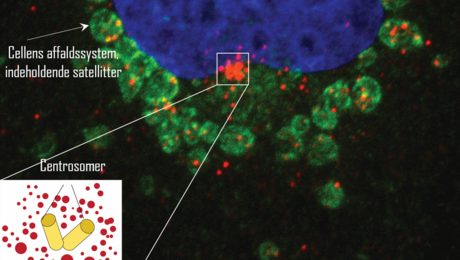Researchers from CARD: Newly discovered cellular waste system protects our genes
Researchers from the DNRF center of Excellence CARD at the Danish Cancer Society have discovered a new waste system in our cells. The system appears to specifically protect our genes and keep them stable, and the system probably plays a significant role in the process whereby healthy cells develop into cancerous cells. The study has been published in Nature Communications.

A new explanation for the reason why normal cells develop into cancer cells is the result of a new publication in the scientific journal Nature Communications. Behind the study is a team of researchers primarily from the DNRF’s Center of Excellence Center for Autophagy, Recycling and Disease (CARD) at the Danish Cancer Society, including lead author Søs Grønbæk Holdgaard and research PI, and Associate Professor Francesco Cecconi.
Popularly, the cell is often compared to a factory and the genes are the part of the “factory” that plans the cell’s various tasks. The genes are therefore vital for our cells to function and divide properly, and a comprehensive safety system keeps an eye out for possible errors. Now, the research from CARD shows that part of this security system is a newly discovered system for waste disposal, specifically designed to protect the genes.
“It has long been known that the body’s cells have a general waste disposal system, but it is quite new that there is actually also a waste system specifically designed to protect our genes and keep them stable. Genetic instability is one of the most important reasons that a normal cell turns into a cancer cell, and so this new knowledge is universal for the development of cancer across many cancer types,” said Associate Professor Cecconi in a press release to the Danish Cancer Society.
Newly discovered waste system is important for cell division
The newly discovered waste disposal system is more specifically responsible for the maintenance of the so-called centrosomes, which play an important role in cell division. Centrosomes are small organelles in the cell whose main purpose is to properly divide and distribute the genetic material within the cell during cell division. Therefore, it is also important for the centrosomes to function properly, but in cancer cells, you often see errors in the centrosomes.
Until now, little has been known about how the errors occur and how the centrosomes are maintained. With the discovery of the new waste system and the functioning of the system, the research indicates that faults in the waste system are contributing to healthy cells developing into cancerous cells.
The Scientific article can be found at Nature Communications here
The lead author of the study, Søs Grønbæk Holdgaard, won second place in 2018 in the Danish National Research Foundation’s photo competition for a photo of, among other things, centrosomes in cancer cells. Read the interview with Holdgaard about the photographs here.
